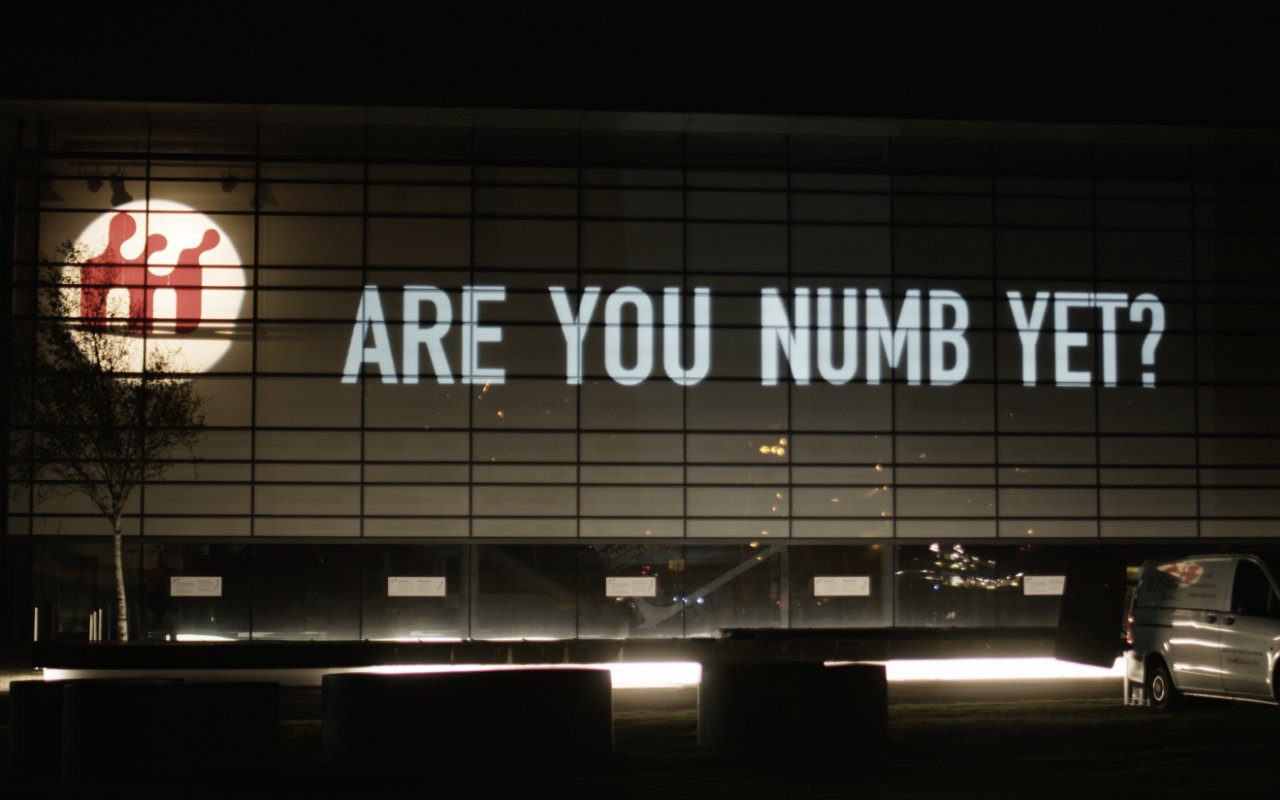
Kel Matsena's poetry projected onto the National Waterfront Museum, Swansea
How does political work get funded?
Who decides what political work is worth funding? And has the moment passed by the time the funding comes through? Kathryn Bilyard and Alistair Spalding share their new rapid response art fund.
We need artists who can shine a light and startle some sense into the world with radical, inspiring ideas. Artcry is a new fund which supports artists to create political work, providing funding in seven days to enable fast action. Set up by a group of artists, activists and creative thinkers, we support more artists to create work as part of our public conversations about current events.
Before the launch of Artcry in November 2020 there was no rolling fund with a turnaround time of less than six-weeks. And as expressly political work was and is not usually funded by charitable trusts and foundations, there was a large gap in funding structures for politically responsive work.
Artists either had to work for free or access funding through personal networks because financial support for responsive work was incredibly difficult. This meant we were losing the voices of artists at critical moments of public heat and debate when those voices could make a real difference.
It was clear to us that the main barrier was funding, so the question became could we start a new fund from scratch? Not a project or a short-lived initiative but a sustainable rolling fund that would fill this gap.
Artist-led response to funding gap
Artcry is our answer to this. An artist-led fund explicitly supporting political work, that is fast and easy to apply for and backs fast-response pieces presented for free in the public realm. We have been open now for over six months and have considered more than 120 applications, funding 8 pieces of work to date.
These include spoken word videos, giant murals, participatory art installations, the print run of a new arts publication, a dance/theatre short film, poetry and large-scale projections – from across the UK.
The most recent was ‘One Year On’ from Kel Matsena and Ryan Jospeh Stafford. In response to the Commission on Race and Ethnic Disparities report and to mark the anniversary of George Floyd’s death, Kel’s poetry was projected in enormous scale onto the front of the National Waterfront Museum in Swansea and also made available online.
Some of the artists we have funded are still students while others are established practitioners; some projects are focused on local issues, some tackle national concerns. What matters to us is they all respond creatively to current political issues, putting artistic voices at the heart of the debate.
A challenging and fast-learning experience
Getting Artcry up and running has been a fast-learning experience for all of us – none of us had set up or run a fund before and we didn’t have any money. We kicked off in October 2020 with one donation, a crowdfunding appeal and a great deal of volunteer time and skills to help us try and make it happen. We opened for applications in November 2020 and started granting out what we had raised so far. It’s a continual fundraising and granting cycle.
Being on the selection panel has been challenging as none of us had done that before either. To feed back in seven days we needed to be reading, debating and responding to applications multiple times a week. But the most challenging part has been saying no. We’ve had some applications that haven’t felt right for our funding, but that we would love to see happen anyway.
Separation of roles
Quite often we slip into producer or collaborator headspaces for projects we are arguing for and want to fund: ‘what if they presented it here, or maybe if they partnered with X?’ Defining and then sticking strictly to our role as a funder while also trying to make that creative, offer additional support or broker connections has been at times a more difficult line to toe than we had anticipated.
We’ve had positive feedback from applicants (both successful and unsuccessful) about the transparency of our decision-making, on being available to answer questions and on giving feedback to each applicant. We are small-scale but as a group of people who both make applications as well as review them, we understand the energy which goes into writing an application and we try and respond to that clearly and personally.
Commitment to support artistic voices
We committed at the start of Artcry that the panel would rotate every six months so that the people making funding decisions change regularly. In the middle of the first change-over it feels more vital than ever. Each panel member brings their own lived experience, their own practice, their own sense of what is ‘urgent’, what is ‘political’, and what work could make a difference. This changing body of people will form Artcry’s identity and I hope its place as a resource for the sector which we will collectively nurture.
Ultimately the goal is to support more artists to make political work in the public realm. Jonzi D summarised the intention very clearly when we first met during the launch saying “it’s not about left or right, it’s about getting more political voices out there. It’s about us having something to say creatively”. That’s the ambition, to support artistic voices who can open up dialogue and provoke deeper thinking about what is happening in our society. We really need that.
You can find out more about the fund, all the work we have funded so far, how to donate or how to join future panels on the website www.artcry.co.uk
Kathryn Bilyard and Alistair Spalding are Founding Directors of Artcry.
Join the Discussion
You must be logged in to post a comment.